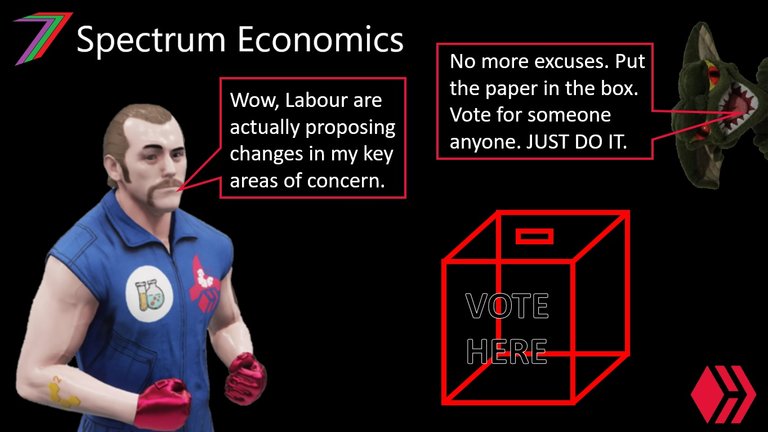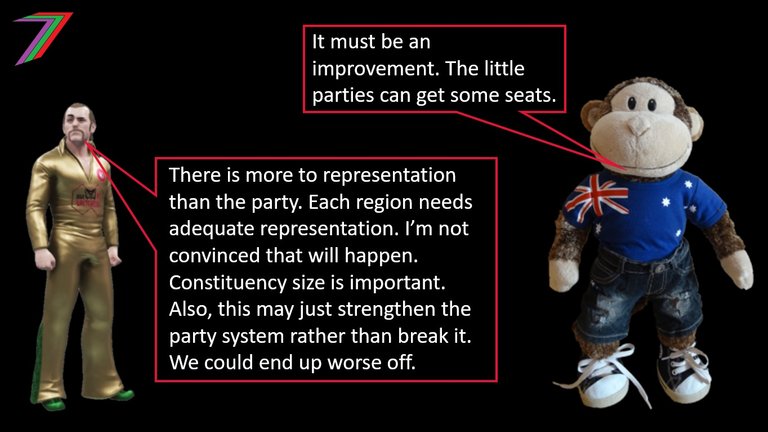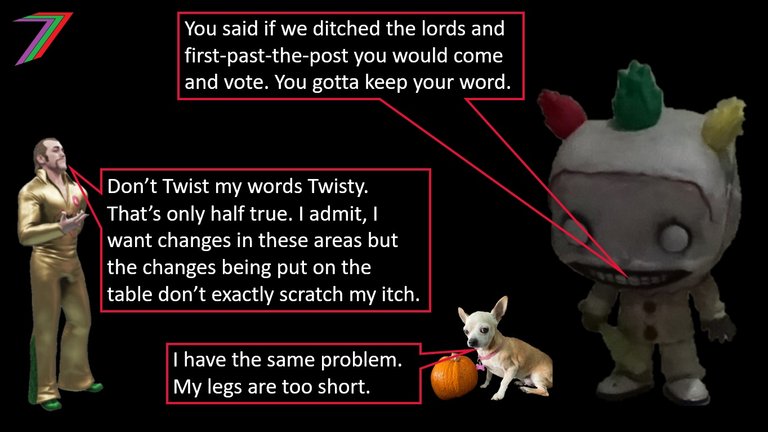Hi Everyone,

Only two months ago in my post What would get me to the ballot box?, I wrote about important changes I wanted to see to the political system before I would conscientiously vote in an election. My first two criteria for change were as follows.
- Change voting system (e.g. Condorcet and Borda Count Voting Systems)
- Replace House of Lords (UK Government) with elected representatives
According to the media, change could be proposed by the UK Labour Party in their next election campaign. ITV reported that Labour may propose replacing first-past-the-post voting and the Daily Mail reported that Labour may replace the House of Lords as part of their General Election promises. This is a strange coincidence considering how recently I wrote about this topic as well as ironic considering these changes are being discussed by the UK Labour Party (major "left-wing" pro-establishment party in the UK).
It is great news that these two areas are being mentioned. This creates opportunities for broader discussions on these topics. The not so good news are the likely proposed changes.
According to the ITV article, Labour are considering changing the first-past-the-post voting system to a proportional representation system. This is a little vague as there are many different types of proportional representation voting systems (e.g. party list, mixed, and preference vote systems). The main aim is to award seats based on the distribution of votes rather than winner takes all for each constituency.
According to the Daily Mail, Labour are considering replacing the House of Lords with an assembly of Regions and Nations. It is a little vague what this will involve but it implies a bigger decision-making role for the individual nations of the UK (Scotland, Wales, and Northern Ireland).
Proportional Representation System

The UK has 650 constituencies. In the 2019 election, the Conservative Party won 365 of the 650 seats. This gave them a large majority that far exceeded the 326 seats needed to form a Government by themselves. Even though, it appeared like an overwhelming victory for the Conservative Party, they only managed 43.6% of the vote. Under a proportional representation system, they may have needed to a form a coalition Government with several other parties or may have even not been able to form Government at all. Table 1 contains the results of the 2019 General Election and the number of seats won by each party under a hypothetical proportional representation system.
Table 1: 2019 General Election Results and PR theoretical
| Party | Vote | Seats (FPTP) | Seats (PR)* |
|---|---|---|---|
| Conservatives | 43.60% | 365 | 283 |
| Labour | 32.10% | 202 | 209 |
| Lib Dems | 11.55% | 11 | 75 |
| SNP | 3.88% | 48 | 25 |
| Green | 2.70% | 1 | 18 |
| Brexit Party | 2.01% | 0 | 13 |
| DUP | 0.76% | 8 | 5 |
| Sinn Fein | 0.57% | 7 | 4 |
| Plaid Cymru | 0.48% | 4 | 3 |
| Alliance | 0.42% | 1 | 3 |
| SDLP | 0.37% | 2 | 2 |
Source: House of Commons General Election 2019: results and analysis
Where FPTP is First-past-the-post and PR is proportional representation.
*Note: proportional representation seat numbers are based on treating the entire electorate as just one constituency. In reality, this would not happen but a realistic scenario with multiple consistencies could not be calculated due to lack of information on how they would be drawn out. However, the above table provides a reasonable idea of how the results would differ from what actually occurred in 2019.
The Conservative Party would obtain considerably less seats under a proportional representation system, the Labour Party would obtain slightly more seats, and the Lib Dems would obtain considerably more seats. The Conservative Party would need another 43 seats from alliances with other parties. Considering the Brexit Party and DUP (hypothetically, 18 seats combined) were the only other parties that supported Brexit and the election was about Brexit, the Conservative Party would not have been able to form Government. The Labour Party would have been more likely to form a coalition Government with the Lib Dems, Greens, and SNP. This coalition, based on the hypothetical scenario, would have given them 327 seats. This would be a massive turnaround in results based purely on a different voting system.
I believe the most likely motivation for the labour Party to propose these changes is the increased chance of winning elections. It could take several election cycles for the Conservative Party and the electorate to adjust to the change in balance of power. Eventually, voting patterns will adjust so that the Labour Party does not obtain a permeant hold of power.
Is a proportional representation system an improvement over first-past-the-post?

It is impossible to offer a complete answer until a more detail proposal is made. Therefore, we should consider broader differences between the two systems. The likely advantages will be a better representation of smaller parties that have some support but rarely sufficient to obtain many seats with a first-past-the-post system. From Table 1, we can see the improved representation for Green, Brexit, and Lib Dems parties. Parties of the devolved nations (Wales, Scotland, and Northern Ireland) might be harmed by a proportional representation system because they only participate in elections within their own countries. This would reduce the representation of these countries in the UK Parliament. This could be similar to the considerably lower representation of smaller countries in the EU Parliament.
The proportional representation systems are party focused but not necessarily region focused. Parties could list candidates primarily based in particular areas. This could lead to some areas receiving little or no representation. This could be partially resolved by having more constituencies. However, as the number of consistencies increase, the proportional representation system becomes less effective because the number of seats become less aligned with the breakdown of the percentage vote for the whole country.
I believe proportional representation systems, under a best case scenario, are an improvement over first-past-the-post systems but are still too flawed to be considered a worthwhile change. I also consider such a change to be harmful to my broader view that parties should be abolished, as proportional representation is party focused and offers no benefit to independent candidates.
Proportional representation systems may not appear to support the two-party system directly but still creates a two option scenario (e.g. Netherlands and Belgium). This occurs because parties need enough seats combined to form Government. The required number of seats is likely to be half plus one seat. For an opposition to form Government in a future election, they will need to form alliances so as to obtain more than 50% of the seats (roughly 50% of the votes). Governments will not be able to be formed until these alliances and eventually coalitions are formed. This offers little or no opportunity for representation in Government for parties or candidates that do not align with themselves with a larger party.
Assembly of Regions

The creation of the assembly of regions could be a response to changing to a proportional representation voting system. A proposed proportional representation system is likely to remove influence in the UK Parliament from the devolved nation’s parties (see previous section for explanation). The assembly of regions could return some of that influence back. I would assume this would enable the devolved nations to debate, amend, and possibly block bills passed in the House of Commons in regards to their application in each or even all the devolved nations.
There are many questions we could ask regarding this assembly. Here are just a few that could greatly influence how it would work.
- Does each devolved nation have their own assembly or is it a combined one?
- Will they have more, less or the same type of powers as the House of Lords?
- How will assembly members be determined (appointed, selected, elected, etc.)?
- Will this assembly reduce any autonomy within the devolved parliaments?
- What bills need to be passed through the assembly?
- Will England have an assembly or be part of an assembly?
- How will disputes between parliament and assemblies be resolved?
There are too many unknown factors to adequately assess if this proposal would be a significant improvement over the House of Lords. It is highly likely that the proposal will be at least a short to medium term benefit to the Labour Party. The UK “Left” has not formed Government in a long time.
My Views

I am excited that voting systems and the House Lords has been raised. Both these areas desperately need reforming. However, I am not particularly hopeful about the proposals from the very vague information that is available. Any proportional representation system will not facilitate any great long term outcome as the party system will remain intact and is likely to be protected even further. I suspect a party list system that could resemble something similar to Belgium or Netherlands could be used. It may even align more closely with the EU voting systems. The Labour Party are likely to attempt to realign the UK more closely with the EU. I would expect at some point they will propose joining the EU single market.
I am also concerned that if Labour’s proposals are part of their election campaign (election promises). There will be very little debate before changes are implemented. Therefore, the changes most advantageous to the Labour Party and the Establishment are likely to be implemented. The current popularity of the Conservative Party and their leader Liz Truss is extremely low (only 14% have a positive opinion of her) (YouGov). If their and her popularity does not improve dramatically before the next General Election (sometime in the next two years). Labour could form Government even under the existing first-past-the-post voting system while pushing through very party favourable versions of their proposed changes. It will be interesting to see if these proposals are raised again in the near future. It is also possible that these early discussions will amount to nothing.
More posts

If you want to read any of my other posts, you can click on the links below. These links will lead you to posts containing my collection of works. These 'Collection of Works' posts have been updated to contain links to the Hive versions of my posts.
Hive: Future of Social Media

Spectrumecons on the Hive blockchain





Hope the coming election would go well. I think one thing that governments should understand is that votes should really matter.
Votes don't really matter. Both the main parties play a part in pushing the same agenda. The only differences are what part of the agenda they can more effectively push or if they need to play a controlled opposition role. Labour Party is due in power sometime in the next few years to push certain things.
We hope its to push things we want and need though.
I think that the plurality of parties is not good, the idea of this parties makes the country unstable in terms of laws and provisions, a unified system must be followed in line with everyone, in my opinion.
If you believe in democracy, then you believe the country should be run by the people. Most so-called democracies are run by Governments who are influenced more by big business than the people.
I believe democracy in its purest form is unworkable and unachievable. However, the underlying principles behind it are great. I believe blockchain (e.g. Hive) is a great example of how these principles can be applied to draw knowledge and opinions from a diverse group of people. This can improve further as the blockchain becomes more decentralised. We are not quite there yet but it is promising.
For this election, the Labor Party must be tougher in defending their rights and requirements. The quality of the work they do must first improve people minds with decreasing work intensity
The Labour Party likes to push socialist ideas. This was quite genuine when Jeremy Corbyn was leader. The new leader Keir Starmer will push some of these ideas (they are easy to sell) but to a lesser extent. Starmer is far from being a socialist. He is an Establishment man.
The Democratic Party does not meet expectations because there is inequality of opportunity in several areas. The policy of freedom that the electorate resort to must have limits so that the people are not overwhelmed by immoral behavior.
Are people fundamentally immoral and purely self-serving? Even if that is the case (I do not believe so), a form of natural order can still occur. People will help each other for personal gain. Those who do not will be punished by society. Insanity is more dangerous to the long-run functionality of society than immorality.
based on your previous post which I reacted to it in the comment section I believe voting system can still go but their should be changes on house of lords. will you still vote if only one of this is changed ?
Posted Using LeoFinance Beta
No. I ask for a lot. I do not want to vote until votes have real meaning. In the post, I outlined one possible path that would lead me to participate. Other things could happen that could be equally as persuasive. I won't know what they are until I see them play out.
Elections however is for the good and progress of the nation so it needs to be done to win the citizens heart by doing the right thing especially from a particular party.
Here's the sales pitch. "Elections equal democracy".
That is far from the truth. Once elected, people loss almost all say in decision-making. Parties cannot be trusted to act in the best interest of the people because they do not need to. That is understood by the main parties and that is why it does not happen.
Congratulations @spectrumecons! You have completed the following achievement on the Hive blockchain and have been rewarded with new badge(s):
Your next target is to reach 77000 upvotes.
You can view your badges on your board and compare yourself to others in the Ranking
If you no longer want to receive notifications, reply to this comment with the word
STOPCheck out the last post from @hivebuzz: